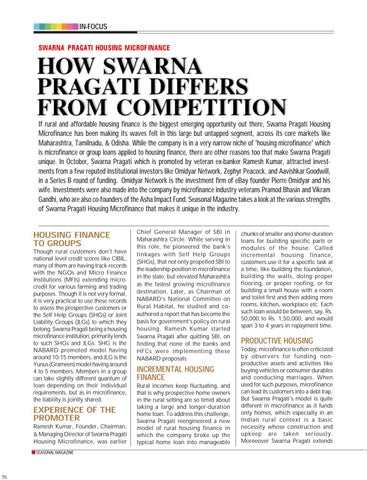IN-FOCUS SWARNA PRAGATI HOUSING MICROFINANCE
HOW SWARNA PRAGATI DIFFERS FROM COMPETITION
If rural and affordable housing finance is the biggest emerging opportunity out there, Swarna Pragati Housing Microfinance has been making its waves felt in this large but untapped segment, across its core markets like Maharashtra, Tamilnadu, & Odisha. While the company is in a very narrow niche of 'housing microfinance' which is microfinance or group loans applied to housing finance, there are other reasons too that make Swarna Pragati unique. In October, Swarna Pragati which is promoted by veteran ex-banker Ramesh Kumar, attracted investments from a few reputed institutional investors like Omidyar Network, Zephyr Peacock, and Aavishkar Goodwill, in a Series B round of funding. Omidyar Network is the investment firm of eBay founder Pierre Omidyar and his wife. Investments were also made into the company by microfinance industry veterans Pramod Bhasin and Vikram Gandhi, who are also co-founders of the Asha Impact Fund. Seasonal Magazine takes a look at the various strengths of Swarna Pragati Housing Microfinance that makes it unique in the industry.
HOUSING FINANCE TO GROUPS
Though rural customers don't have national level credit scores like CIBIL, many of them are having track-records with the NGOs and Micro Finance Institutions (MFIs) extending microcredit for various farming and trading purposes. Though it is not very formal, it is very practical to use these records to assess the prospective customers or the Self Help Groups (SHGs) or Joint Liability Groups (JLGs) to which they belong. Swarna Pragati being a housing microfinance institution, primarily lends to such SHGs and JLGs. SHG is the NABARD promoted model having around 10-15 members, and JLG is the Yunus (Grameen) model having around 4 to 5 members. Members in a group can take slightly different quantum of loan depending on their individual requirements, but as in microfinance, the liability is jointly shared.
EXPERIENCE OF THE PROMOTER Ramesh Kumar, Founder, Chairman, & Managing Director of Swarna Pragati Housing Microfinance, was earlier SEASONAL MAGAZINE
70
Chief General Manager of SBI in Maharashtra Circle. While serving in this role, he pioneered the bank’s linkages with Self Help Groups (SHGs), that not only propelled SBI to the leadership position in microfinance in the state, but elevated Maharashtra as the fastest growing microfinance destination. Later, as Chairman of NABARD’s National Committee on Rural Habitat, he studied and coauthored a report that has become the basis for government’s policy on rural housing. Ramesh Kumar started Swarna Pragati after quitting SBI, on finding that none of the banks and HFCs were implementing these NABARD proposals.
INCREMENTAL HOUSING FINANCE Rural incomes keep fluctuating, and that is why prospective home owners in the rural setting are so timid about taking a large and longer-duration home loan. To address this challenge, Swarna Pragati reengineered a new model of rural housing finance in which the company broke up the typical home loan into manageable
chunks of smaller and shorter-duration loans for building specific parts or modules of the house. Called incremental housing finance, customers use it for a specific task at a time, like building the foundation, building the walls, doing proper flooring, or proper roofing, or for building a small house with a room and toilet first and then adding more rooms, kitchen, workplace etc. Each such loan would be between, say, Rs. 50,000 to Rs. 1,50,000, and would span 3 to 4 years in repayment time.
PRODUCTIVE HOUSING Today, microfinance is often criticized by observers for funding nonproductive assets and activities like buying vehicles or consumer durables and conducting marriages. When used for such purposes, microfinance can lead its customers into a debt trap. But Swarna Pragati's model is quite different in microfinance as it funds only homes, which especially in an Indian rural context is a basic necessity whose construction and upkeep are taken seriously. Moreeover Swarna Pragati extends
